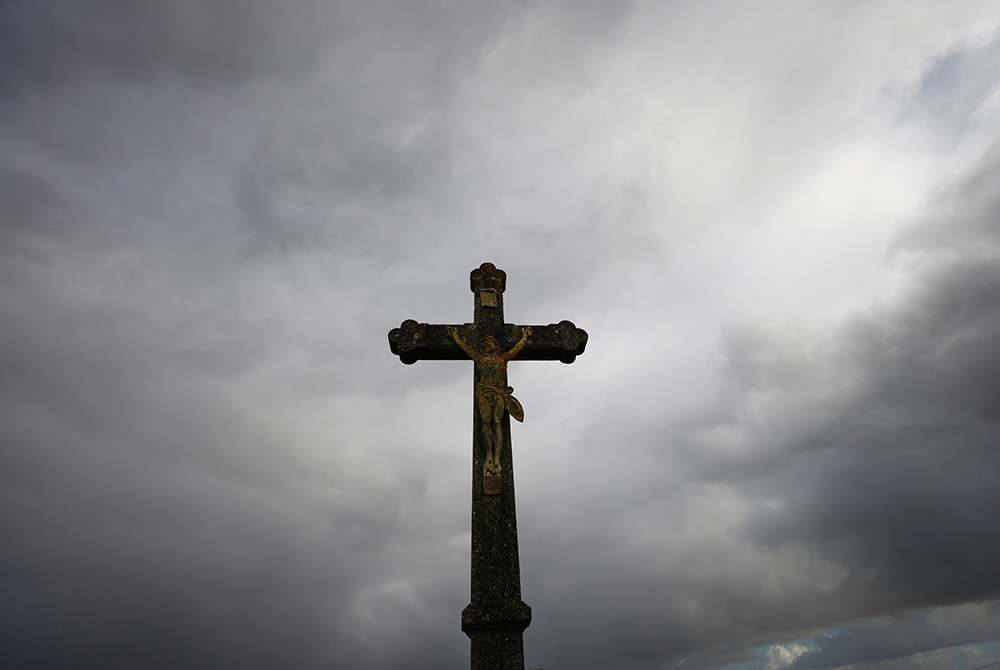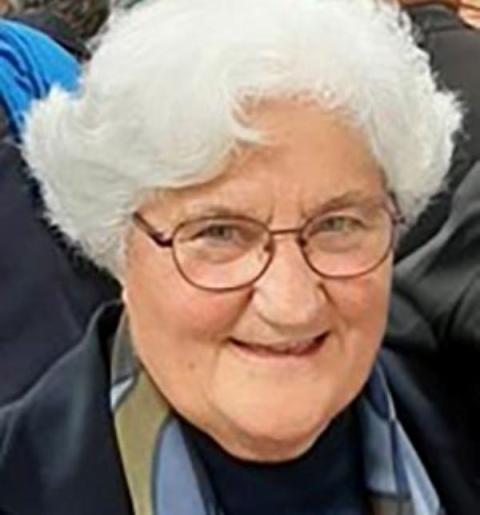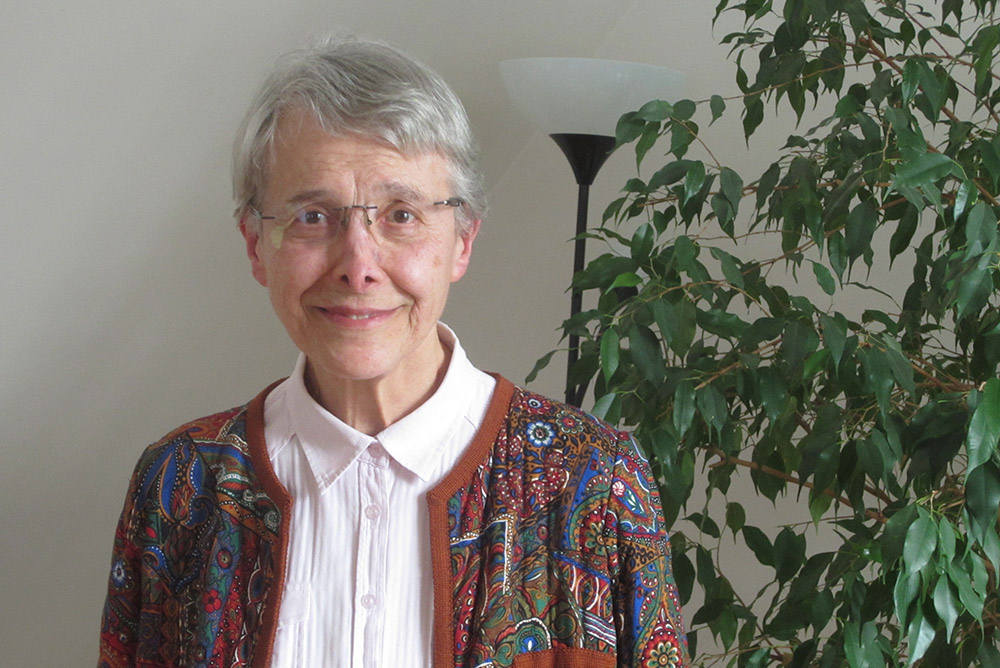
A cross is silhouetted outside a Catholic church Oct. 5 near Nantes, France. (CNS/Reuters/Stephane Mahe)
Following publication of the report on sexual abuses in the Catholic Church, many women religious in France — while distressed over the report's findings — have high hopes for the future. They think now is the time to start making changes in the way the church is governed — to be synodal, and more horizontal, to include more people in the process of decision making.
For five years, I've interviewed women religious in France on various topics for Global Sisters Report, including sexual abuse within the church. It's been disheartening and distressing to learn of the extent of the abuse as the recent report revealed — more than 330,000 cases of sexual abuse of minors, two-thirds by clerics, had taken place in the French church since 1950, according to the report released in October. Yet as my conversations reveal, Catholic sisters hold a unique position to help move the church forward after these devastating scandals.
"We are all very pleased to see these abuses denounced," Sr. Christiane Hourticq, a member of the Society of Helpers, told me. "But I must add that these crimes did not affect anyone's faith in God in our congregation."
Not all parishioners agree: Some confess it's impossible to go to Mass on Sunday, even if they separate their faith in God from the fact of going to church.
Religious women, who are lay people but have consecrated their life to God, are in a special position to bridge the widening gap between the clerics — all male — and lay people. As in other countries, most church activities in France are organized and led by women. They are responsible for Sunday school as well as for housekeeping of churches. A secretary, usually a woman, is in charge of the priests' agendas. Women make up about two-thirds or more of the faithful at most celebrations. At the same time, priests make all decisions.

Sr. Marie Hélène Halligon of the Congregation of our Lady of Charity of the Good Shepherd
"If a priest is not happy with the way a parish functions, he can just decide to cancel some activities without having to refer to the parish council or any authority," Sr. Marie Hélène Halligon of the Congregation of our Lady of Charity of the Good Shepherd told me in one conversation. "Our congregations do not work that way. Decisions are made by the superior, after consulting others."
"In our congregations, the superior cannot take a decision without referring to the rest of the community," echoes Sr. Christiane. "If the community is against it, she cannot do it. If the congregation agrees, she can decide to do it or not."
Priests and bishops make their own decisions. Sometimes, congregations have to beg them to come and say Mass. "Since we now have fewer and fewer priests, it is harder to find someone to celebrate the Eucharist," Sr. Marie Hélène said regretfully. "But what is more important? The needs of the people of God, including the ability to receive sacraments, or the powers and prerogatives of priests?"
In "Crisis in the church: clericalism in question," which Sr. Christiane wrote for a 2018 lecture she gave at a parish of Deuil-La-Barre, in the Paris region, she laid out the issues: "The problem lies with the image of the priest and the way his role is seen," she wrote. "We have started considering the priest independently of his people. A caste of clerics has been formed. This was the model designed by the council of Trent in the 16th century," against the Reformation called for by Martin Luther in Germany.
Sr. Christiane stresses the need to make a distinction: "It is not because the priest presides over the Eucharist that he presides over the community; it is because he presides the community that he presides [over] the Eucharist," she wrote.
"A lot of married men are very able and competent to preside [over] a community. They should be able to be ordained," she told me. She sees it as even more necessary now that a lot of regions in the world do not have enough priests and can only have the Eucharist every few weeks or months. Personally, she doesn't wish that women are ordained, "not as long as the figure of the priest is the one we have inherited from the Trent council."
"The Eucharist takes our life as a whole and is not only about priests," Sr. Eliane Loiseau, a Missionary of the Gospel, told me. "We need to invent [a] new way to celebrate. What we have experienced during the COVID pandemic made us progress in our communities with live celebrations where God's Word is central.
Being together while listening to God's word is a Real Presence. Be[ing] at the service of the poor is also a Real Presence, as much as sharing the bread to increase fraternity. These three dimensions of the Eucharist matter to all of us, men, women, priests. Let us work to promote small fraternal communities who live all these dimensions of the Eucharist."

Sr. Christiane Hourticq of the Soeurs Auxiliatrices des Âmes du Purgatoire (Elisabeth Auvillain)
'If a priest is not happy with the way a parish functions, he can just decide to cancel some activities … Our congregations do not work that way. Decisions are made by the superior, after consulting others.'
—Sr. Marie Hélène Halligon
Celebrations without a priest, and without the Eucharist, are more and more common in France. That's partly because the lack of priests has led communities to organize these liturgies of the word, but also because a lot of Catholics prefer small and simple celebrations to pompous Masses.
A group called Conférence Catholique des Baptisés Francophones was created in 2013 by Catholics who wanted the church to give a larger place to women and laypeople. It encourages prayer meetings or discussions as well as liturgies of the word and creates connections between different communities of faithful who organize them. Their number has been steadily growing.
This trend started in regions without enough priests; it continues when the faithful are not happy with their local community. Catholic who feel ill at ease in a church that doesn't consider very highly lay people and especially women, prefer to join such a community and do not go to Mass anymore.
During one of the confinements imposed by the COVID pandemic last year, some congregations held liturgies of the word, every Sunday, without a priest. A sister, who did not want her or her congregation to be named, told me that, one Sunday morning, a priest called to offer to say Mass since he was confined in the neighborhood. The superior told him the community had made other plans for worship and declined the offer.

Sr. Christine Danel, superior general of the Xaviere Sisters or Missionaries of Jesus Christ, addressed a closing mass on Nov. 1 for a weeklong celebration of the Ignatian Family, directly after a bishop preached the homily. (Courtesy Véronique Rouquet / Xaviere Sisters)
A sister who took part in liturgies of the word during last year's confinement shared her experience in a special edition of the Jesuit review Christus. "During these Sundays," Sr. Geneviève Perret wrote. "I was happily exempt from these Sunday masses where I am in the middle of a crowd, largely anonymous; where its president is often at some distance from the faithful and stands higher on a stage; where I, a woman sitting on a chair, have to hear a homily that he, a man standing, delivers and where I do not have the slightest possibility of reacting."
Sr. Geneviève, a member of the Society of Helpers, also reckons that it is important that communities are open and pray with other believers even if they do not like some celebrations very much.

Dominican Sr. Anne Lécu (Provided photo)
She concludes that this experience has reinforced her wish for a church "less clerical and more welcoming where poor people and women would have their place."
"It is high time we go back to the Gospel," agrees Sr. Eliane. "I think we should read it from the point of view of the poor at the peripheries. This is what I have done when I was in Latin America and it has guided me until today."
There have also been times when a sister was allowed to comment on the Gospel. Sr. Anne Lécu, a Dominican, spoke in St. Ignace, Paris’s Jesuit church, on the fourth Sunday of Lent, March 14, 2021. A gathering of the Ignatian family in Marseille on Nov. 1, 2021, also provided the opportunity for a superior general, Sr. Christine Danel of the Xaviere Sisters, or Missionaries of Jesus Christ, to preach at the end of Mass. Such gestures are now expected by parishioners, eager to see a sign that priests are ready to share some of their power. Canon law says the celebrant may ask someone to comment the readings, but this will not be called a homily.
Since it is more and more difficult to deny equal responsibilities for women, the question of ordaining also arises, despite the opposition from the Vatican.
Advertisement
Religious women sometimes wonder why their superior cannot celebrate the Eucharist: In 2019, the prioress of the monastery of the Missionary Benedictine Sisters of Tutzing, in Germany, caused a stir by calling for gender equality in the Catholic Church.
"I take for granted that a woman can also be ordained,” said Sr. Ruth Schönenberger later said in a Global Sisters Report interview, repeating her views, which were initially aired in the German media. “I do not understand the reasons against it. I am surprised that the presence of Christ is reduced to being a man. We have here also qualified theologians who only lack consecration — nothing else.”
The image of priests in France has been very tarnished, but religious women are still well viewed. Will they take the lead in pressing for more gender equality in the church? If the church wants to retain some of its damaged credibility, it would be a good idea them to do so.





